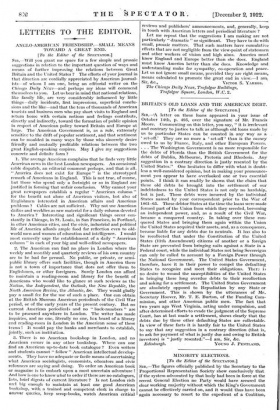LETTERS TO THE EDITOR.
ANGLO-AMERICAN FRIENDSHIP.—SMALL MEANS
TOWARD A GREAT END. [To the Editor of the SPECTATOR.]
you grant me space for a few simple and prosaic suggestions in relation to the important question of ways and means of further improving the relations between Great Britain and the United States ? The efforts of your journal in that direction are cordially appreciated by American journal- ists—of whom I am one, being an editorial writer on the
Chicago Daily News—and perhaps my ideas will commend themselves to you. Let us bear in mind that national relations,
like family life, are very considerably influenced by little things—daily incidents, first impressions, superficial conclu- sions and the like—and that the tens of thousands of American tourists and business men who pay short visits to England and return home with certain notions and feelings contribute, directly and indirectly, toward the formation of public opinion in respect of American policy toward Britain and Europe at large. The American Government is, as a rule, extremely sensitive to the drift of popular sentiment, and that sentiment can be moulded in many ways by those who sincerely desire friendly and mutually profitable relations between the two great English-speaking empires. May I give my suggestions concrete and definite form ?
1. The average American complains that he finds very little American news in the best London newspapers. An occasional cable dispatch, an editorial comment perhaps, and that is. all. "America does not exist for Europe" is the stereotyped remark of Americans in England. This is not true, of course, but those who spend only a fortnight or so in England are justified in forming that unfair conclusion. Why cannot your great newspapers establish a regular "American column" for the benefit not alone of American visitors, but also of Englishmen interested in American affairs and American problems ? Cables are not sufficient. Why not use American dailies and weeklies as raw material for a daily column devoted to America ? Interesting and significant things occur con- stantly in Chicago, in St. Louis, in San Francisco, in Portland, in other American cities, and the civic, industrial and political life of America affords ample food for reflection even to old- -world men and women of education and intelligence. I would most earnestly urge the establishment of a daily "American column" in each of your big and well-edited newspapers.
2. The American can find no place in London where the weekly and monthly and quarterly reviews of his own country are to be had for perusal. No public, or private, or semi- public library offers such facilities, though in America there is not a town of importance that does not offer them to Englishmen, or other foreigners. Surely London can afford to maintain a reading-room and library for the benefit of Americans who would like to glance at such reviews as the Nation, the Independent, the Outlook, the New Republic, the North American Review, the Atlantic, &c. They would gladly pay a small fee for the use of such a place. One can obtain at the British Museum American periodicals of the Civil War period, or of the early years of the present century. But no current American periodicals and no " back-numbers " are to be procured anywhere in London. The writer has made inquiries, and no one, literally no one, has heard of a library and reading-room in London in the American sense of these terms ! It would pay the banks and merchants to establish, jointly, such an institution.
3. There is no American bookshop in London, and no American corner in any other bookshop. Where can one find an American up-to-date book catalogue ? Even writers and students cannot " follow " American intellectual develop- ments. They have no adequate or facile means of ascertaining what American sociologists, economists, educators and civic reformers are saying and doing. To order an American book or magazine is to embark upon a most uncertain adventure ! And how is one to know what to order if there are no catalogues, lists, brief digests of current literature ? Is not London rich and big enough to maintain at least one good American bookshop, with a trained and competent clerk 'in charge to answer queries, keep scrap-books,_ watch American critical
reviews and publishers' announcements, and, generally, keep, in touch with American letters and periodical literature ?
Let me repeat that the suggestions I am making are not particularly" dramatic" or significant. They have to do with small, prosaic matters. That such matters have cumulative effects that are not negligible from the view-point of statesmen and other workers of vision and high aims. America must know England and Europe better than she does. England must know America better than she does. Knowledge and understanding make for sympathy, co-operation and peace. Let us not ignore small means, provided they are right means, means calculated to promote the great end in view.—I amr The Chicago Daily News, Trafalgar Buildings, Trafalgar Square, London, IV .C. 2,






































































 Previous page
Previous page